Unit 7 Will people have robots?词汇拓展与短语句型归纳2023-2024学年人教版八年级英语上册(含部分答案)
文档属性
| 名称 | Unit 7 Will people have robots?词汇拓展与短语句型归纳2023-2024学年人教版八年级英语上册(含部分答案) | 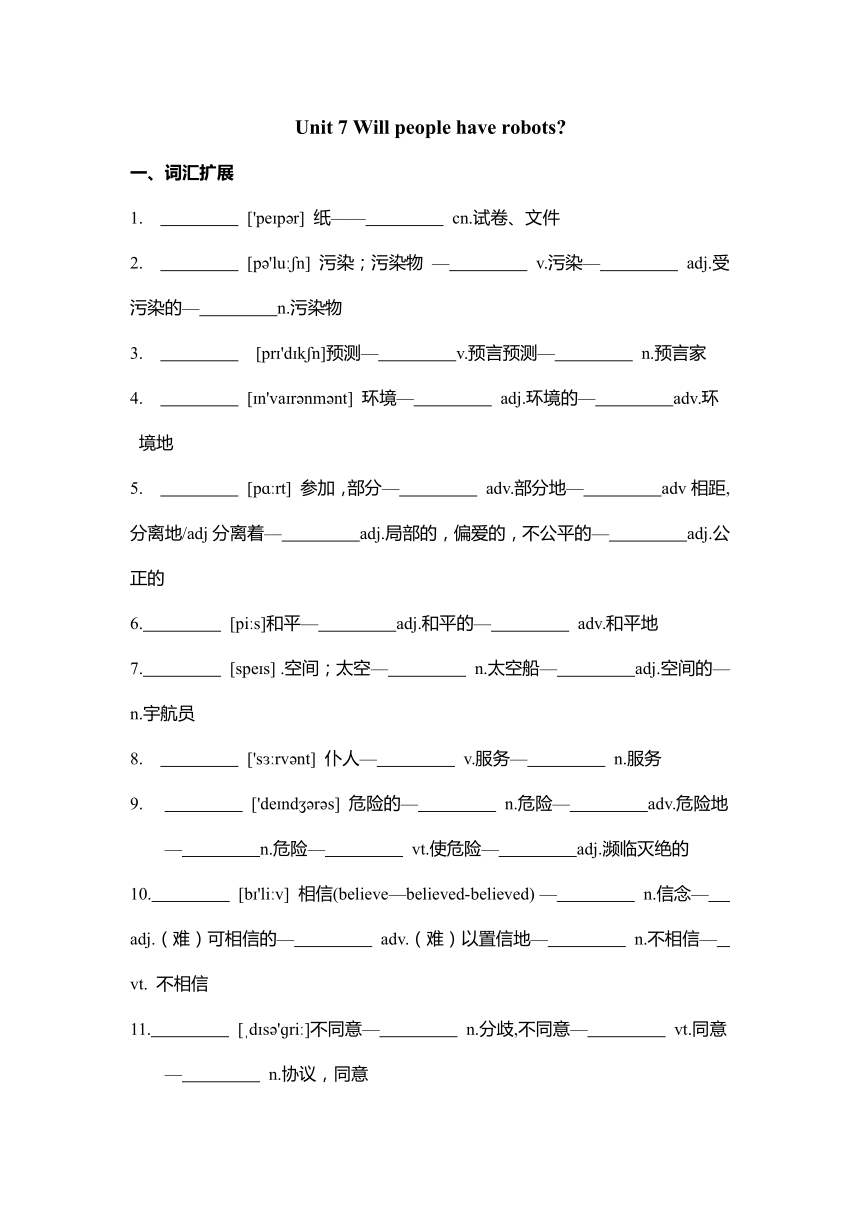 | |
| 格式 | docx | ||
| 文件大小 | 32.0KB | ||
| 资源类型 | 教案 | ||
| 版本资源 | 人教新目标(Go for it)版 | ||
| 科目 | 英语 | ||
| 更新时间 | 2023-11-27 16:46:14 | ||
图片预览

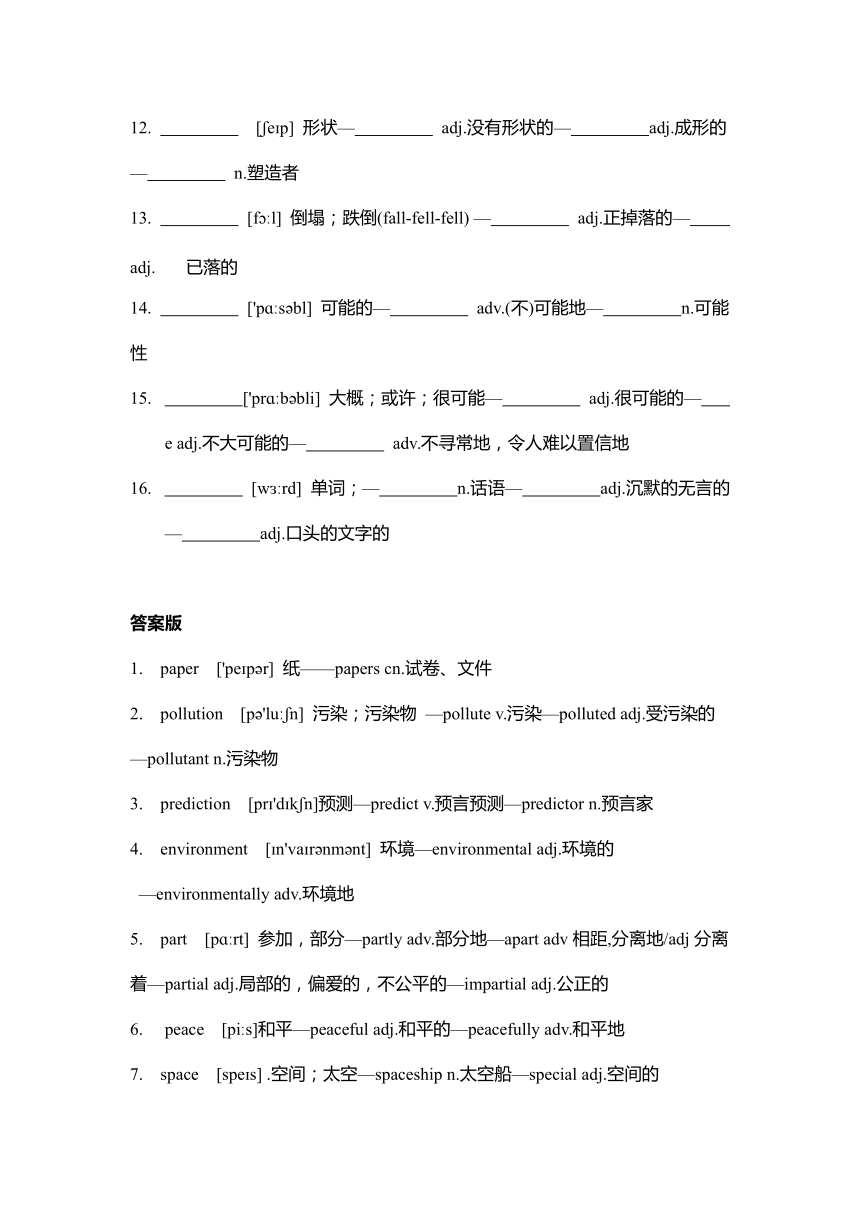
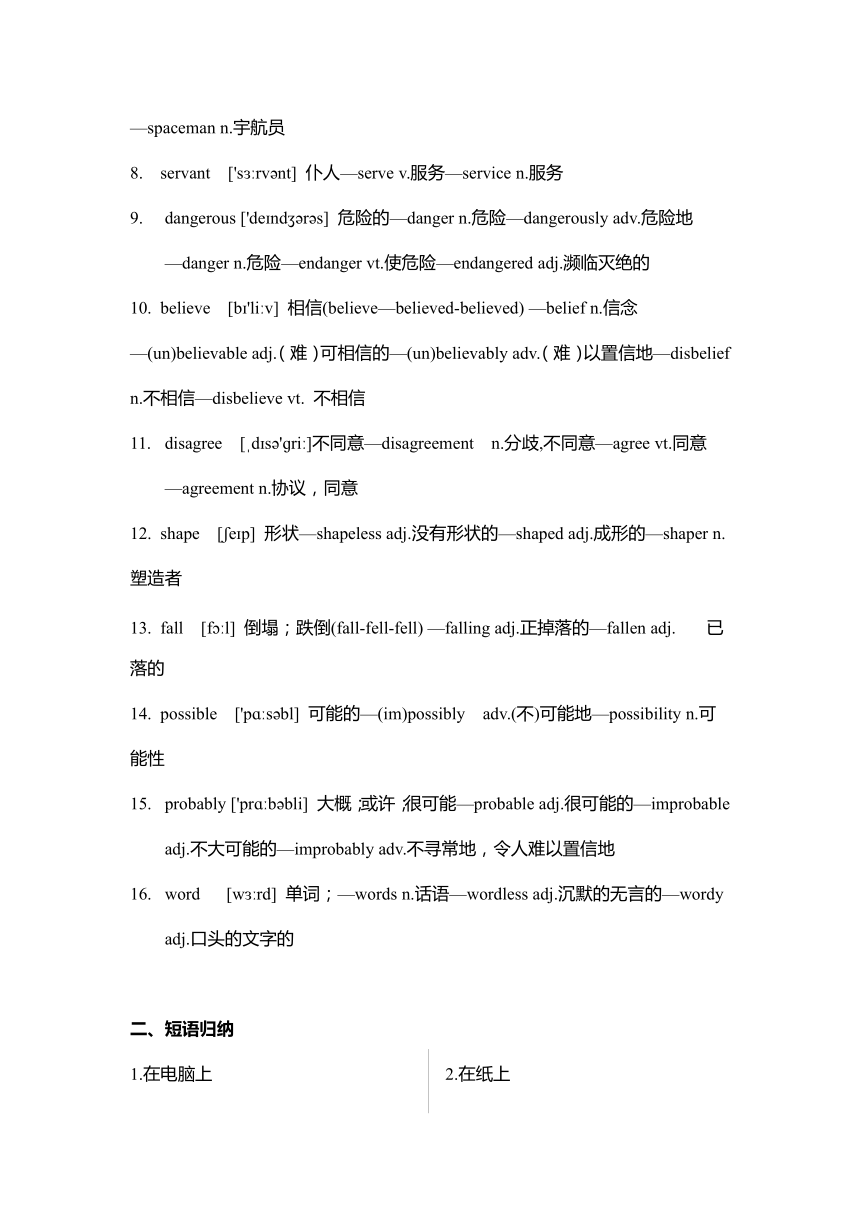
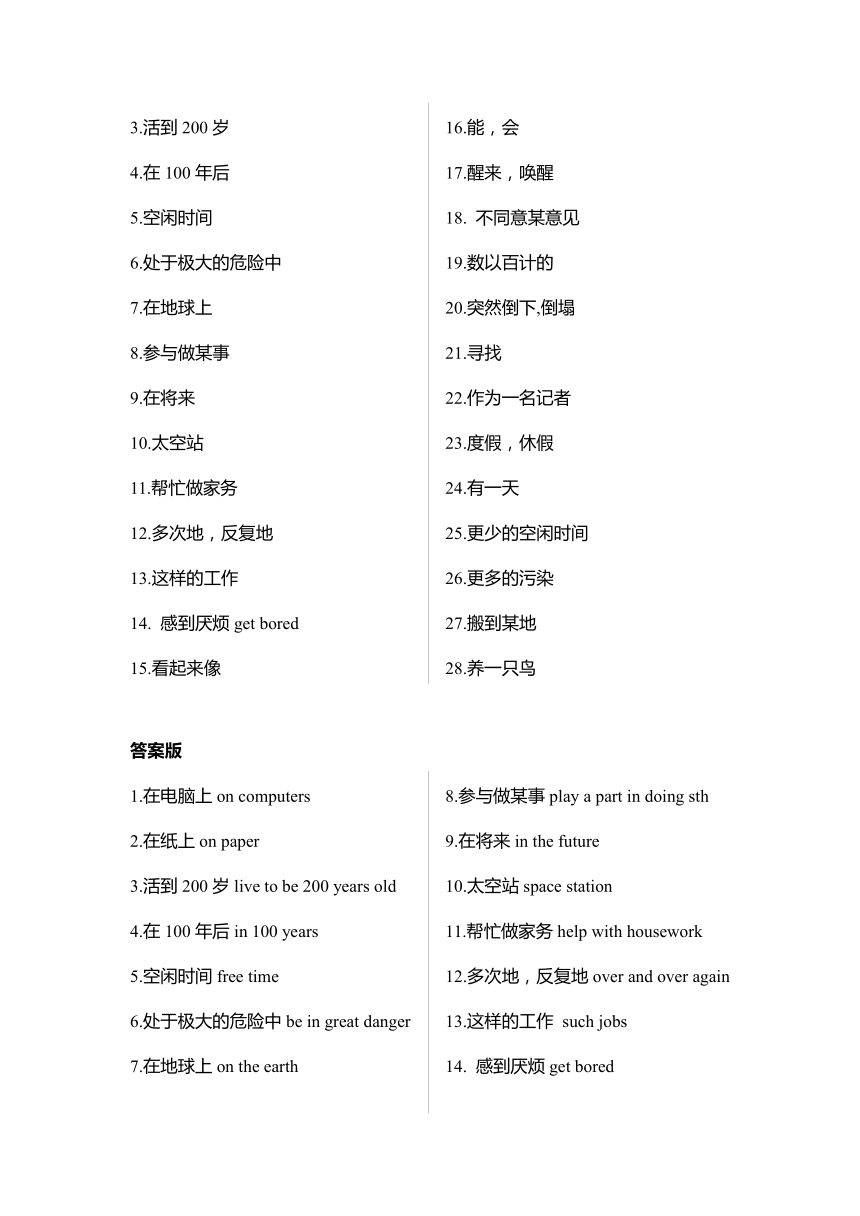
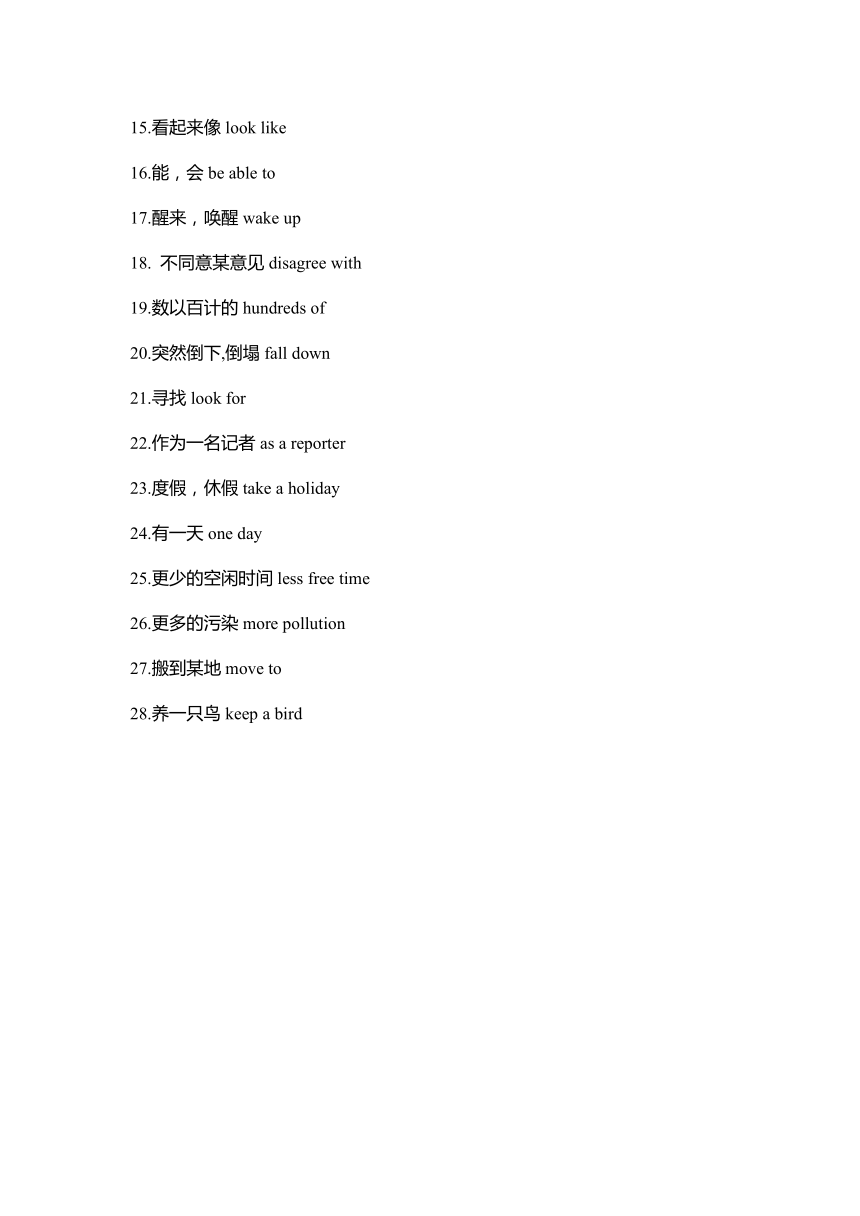
文档简介
Unit 7 Will people have robots
词汇扩展
1. ['pe p r] 纸—— cn.试卷、文件
2. [p 'lu n] 污染;污染物 — v.污染— adj.受污染的— n.污染物
3. [pr 'd k n]预测— v.预言预测— n.预言家
4. [ n'va r nm nt] 环境— adj.环境的— adv.环境地
5. [pɑ rt] 参加,部分— adv.部分地— adv相距,分离地/adj分离着— adj.局部的,偏爱的,不公平的— adj.公正的
6. [pi s]和平— adj.和平的— adv.和平地
7. [spe s] .空间;太空— n.太空船— adj.空间的— n.宇航员
8. ['s rv nt] 仆人— v.服务— n.服务
9. ['de nd r s] 危险的— n.危险— adv.危险地— n.危险— vt.使危险— adj.濒临灭绝的
10. [b 'li v] 相信(believe—believed-believed) — n.信念— adj.(难)可相信的— adv.(难)以置信地— n.不相信— vt. 不相信
11. [ d s 'ɡri ]不同意— n.分歧,不同意— vt.同意— n.协议,同意
12. [ e p] 形状— adj.没有形状的— adj.成形的— n.塑造者
13. [f l] 倒塌;跌倒(fall-fell-fell) — adj.正掉落的— adj.已落的
14. ['pɑ s bl] 可能的— adv.(不)可能地— n.可能性
15. ['prɑ b bli] 大概;或许;很可能— adj.很可能的— e adj.不大可能的— adv.不寻常地,令人难以置信地
16. [w rd] 单词;— n.话语— adj.沉默的无言的— adj.口头的文字的
答案版
1. paper ['pe p r] 纸——papers cn.试卷、文件
2. pollution [p 'lu n] 污染;污染物 —pollute v.污染—polluted adj.受污染的—pollutant n.污染物
3. prediction [pr 'd k n]预测—predict v.预言预测—predictor n.预言家
4. environment [ n'va r nm nt] 环境—environmental adj.环境的—environmentally adv.环境地
5. part [pɑ rt] 参加,部分—partly adv.部分地—apart adv相距,分离地/adj分离着—partial adj.局部的,偏爱的,不公平的—impartial adj.公正的
6. peace [pi s]和平—peaceful adj.和平的—peacefully adv.和平地
7. space [spe s] .空间;太空—spaceship n.太空船—special adj.空间的—spaceman n.宇航员
8. servant ['s rv nt] 仆人—serve v.服务—service n.服务
9. dangerous ['de nd r s] 危险的—danger n.危险—dangerously adv.危险地—danger n.危险—endanger vt.使危险—endangered adj.濒临灭绝的
10. believe [b 'li v] 相信(believe—believed-believed) —belief n.信念—(un)believable adj.(难)可相信的—(un)believably adv.(难)以置信地—disbelief n.不相信—disbelieve vt. 不相信
11. disagree [ d s 'ɡri ]不同意—disagreement n.分歧,不同意—agree vt.同意—agreement n.协议,同意
12. shape [ e p] 形状—shapeless adj.没有形状的—shaped adj.成形的—shaper n.塑造者
13. fall [f l] 倒塌;跌倒(fall-fell-fell) —falling adj.正掉落的—fallen adj.已落的
14. possible ['pɑ s bl] 可能的—(im)possibly adv.(不)可能地—possibility n.可能性
15. probably ['prɑ b bli] 大概;或许;很可能—probable adj.很可能的—improbable adj.不大可能的—improbably adv.不寻常地,令人难以置信地
16. word [w rd] 单词;—words n.话语—wordless adj.沉默的无言的—wordy adj.口头的文字的
二、短语归纳
1.在电脑上
2.在纸上
3.活到200岁
4.在100年后
5.空闲时间
6.处于极大的危险中
7.在地球上
8.参与做某事
9.在将来
10.太空站
11.帮忙做家务
12.多次地,反复地
13.这样的工作
14. 感到厌烦get bored
15.看起来像
16.能,会
17.醒来,唤醒
18. 不同意某意见
19.数以百计的
20.突然倒下,倒塌
21.寻找
22.作为一名记者
23.度假,休假
24.有一天
25.更少的空闲时间
26.更多的污染
27.搬到某地
28.养一只鸟
答案版
1.在电脑上on computers
2.在纸上on paper
3.活到200岁live to be 200 years old
4.在100年后in 100 years
5.空闲时间free time
6.处于极大的危险中be in great danger
7.在地球上on the earth
8.参与做某事play a part in doing sth
9.在将来in the future
10.太空站space station
11.帮忙做家务help with housework
12.多次地,反复地over and over again
13.这样的工作 such jobs
14. 感到厌烦get bored
15.看起来像look like
16.能,会be able to
17.醒来,唤醒wake up
18. 不同意某意见disagree with
19.数以百计的hundreds of
20.突然倒下,倒塌fall down
21.寻找look for
22.作为一名记者as a reporter
23.度假,休假take a holiday
24.有一天one day
25.更少的空闲时间less free time
26.更多的污染more pollution
27.搬到某地move to
28.养一只鸟keep a bird
三、必背句子
1. I think so.我认为是这样。I don’t think so.我不这样认为。
2. I hope so.我希望如此。I hope not.我希望不这样。
3. In 50 years, people will have more free time because there will be less things to do.
50年后,人们将有更多的空闲时间,因为他们会有更少的事情做。
4. In 20 years, I think I’ll be a newspaper reporter.20年以后,我想我会成为一个报社记者。
5. However, some scientists believe that although we can make robots move like people, it will be difficult to make them really think like a human.然而,一些科学家认为,尽管我们能够让机器人像人类一样运动,但让他们像人类一样真正地思考却很困难。
6. For example, scientist James White thinks that robots will never be able to wake up and know where they are.例如,科学家詹姆斯 怀特认为,机器人将永远不会醒来知道他们身处何处。
7. This was not possible 20 years ago, but computers and rockets also seemed impossible 100 years ago.这在20年前是不可能的,但是计算机和火箭在100年前也是看起来不可能的。
8. You should also remember that there will be both good and bad things in life.你也应该记住,生活中有好事也有坏事。
四、语法讲解
一般将来时
定义:一般将来时表示将来某个时间要发生的动作,事情或存在的状态,也表示将来经常或反复发生的动作或事情。
常见用法:
1.will/shall+动词原形 shall用于第一人称,常被will 所代替。will 在陈述句中用于各种人称,在征求意见时常用于第二人称。will not=won't shall not=shan't
2. be going to +不定式,表示将来。
单元课时练
单选
1.—Every year, many people get ill because of pollution.
—Yes, that's true. It's our duty to_________ pollution and improve the situation.
A.produce B.provide C.recycle D.reduce
2.—Air _______________ is one of the biggest problems in the world today.
—Yes. We must take action to make the air less _______________.
A.pollution;pollution B.pollute;pollution
C.pollution;pollute D.pollution;polluted
3.—I forgot to bring my notebook here. Could you please lend me two________, Linda
—OK, here you are.
A.paper B.papers C.piece of paper D.pieces of paper
4.— Will you give ______ some______
— Yes, I will.
A.my; paper B.me; paper C.me; papers D.my; papers
5.The water is _____. We must be careful of ______.
A.pollute, pollute B.polluted, polluted
C.polluted, pollution D.polluting, pollution
6.Jim is tall but Tom is________taller.
A.very B.even C.too D.more
7.- ___________ will your brother be back from Shenzhen
-In two weeks.
A.How long B.How soon C.How many times D.How often
8.Doctors often suggest, “ ___________ vegetables and ___________ meat can help you keep fit. ”
A.More; less B.Few; much C.Fewer ; more D.Less; more.
9.Let's play a part ___________ our classroom.
A.clean B.to clean C.in cleaning D.cleaning
10.—I think teenagers can drive.
—___________. They aren't serious enough.
I agree with you B.I think so
C.I disagree with you D.That's right
二、完型
We are now in 2123. Life is quite ___1___ from that in 2021. We can do many things, but we do them differently.
___2___ example, we have e-friends to help us. An e-friend is a machine. It ___3___ just like a human being. It can walk, talk and do almost ___4___ the same as humans. My e-friend is similar ___5___ me and we have a lot of fun together. She helps me with my homework and we often go swimming. She is ready to take care of (照顾) me ___6___ anything happens, so I always feel happy when we are together. She can also ___7__ me messages and I can read information from her mind. It’s great to have an e-friend. If I have ___8___ problems, I will talk to my e-friend.
I would like to tell you more about ___9___ in 2123, but I have to ask my e-friend to clean up my room. ___10___ one day I will be able to travel back. I’m looking forward to visiting you.
1.A.normal B.possible C.important D.different
2.A.As B.For C.With D.From
3.A.looks B.feels C.finds D.tastes
4.A.nothing B.anything C.something D.everything
5.A.at B.in C.to D.with
6.A.if B.or C.though D.because
7.A.fill B.send C.print D.share
8.A.any B.some C.other D.another
9.A.fact B.life C.news D.dreams
10.A.Yet B.In fact C.Maybe D.Of course
三、阅读理解
People use money to buy food, books and hundreds of other things they need.When they work, they usually get paid(酬劳) in money.
Most of the money used today is made of metal(金属) or paper.But in the time long ago, people used to use all kinds of things as money.One of the first kinds of money was shells.
In China, cloth and knives were used as money.Elephant tusks(牙), monkey tail(尾巴) and salt were used in some parts of the world.Rice was also a kind of money used by the people in some islands.
The first copper coins (硬币)were made in China.They were round and had a square hole in the center.Different countries have used different metals for their money.Later, some countries began to make coins of gold and silver (银).But gold and silver were too heavy to carry when people needed a lot of coins to buy something expensive.The Chinese were the first to use paper money.The first paper money cooked more like a note from one person to another than the paper money used today.
Money has had an interesting story from the days of shell money till today.
1.People usually use money. ______
A.to buy gold B.to buy something expensive
C. to get something they want D.to buy shells
2.Long, long ago people all over the world used______ as money.
A.the same metal B.the same paper
C.the different metals D.all kinds of things
3.In the past, the ancient Chinese used to have cloth and knives______.
A.as a tool B.as a kind of goods
C.as a gift D. as money
4. ______ was also a kind of money used by the people on some islands.
A. Rice B.Animals C. Gold . D.Knives
5.The first paper money____________
A.looked like the same as the paper money used today
B.looked interesting
C.had a square hole in the center
D.looked like a note
四、用括号中所给单词的适当形式填空
1.There ______ (be) a football game next Wednesday.
2.Kids will study at home on _____(computer).
3.It is too late. I ________ (agree) that we can get there on time.
4.Trees ________ down when the typhoon came yesterday. (fall)
5.Air __________(pollute) is very serious in some big cities.
6. Don’t ask Mrs. Gao any (person) questions such as her age or marriage.
7. At the (begin) of the meeting, we sang an English song together.
8. I don’t know how (improve) my English.
9. Monica wants to be a (drive) in the future.
10. Phoebe (not come) to the party tomorrow, because she is too busy.
五、翻译
1. 在这个镇上每个人都应该参与到清扫的工作中!
Everyone in this town it up!
2. 他们一遍又一遍地做着简单的工作。
They do simple jobs .
3. What happened There are (数百) people crowding round there.
4. 那时警察在找那个失踪的孩子。
At that time, the police were the lost child.
5. 如果继续下雨,那个房子说不定会倒塌。
That house might if it continues to rain.
6.机器人在某个方面看起来像人类。
Robots look like humans ________ ________ ________.
7.这些男孩正在到处找他们的篮球。
The boys are ________ ________their basketball everywhere.
8.我认为这部电影有点无聊。
I think the movie is________ ________boring.
9.我住在街对面的那幢公寓里。
I live in the apartment from the street.
10.人人都应该参与到减少污染中去。
Everyone should in reducing the pollution.
六、改写句子
1.His uncle left for Rizhao yesterday. (用in about three days改写句子)
His uncle ______ _______ for Rizhao in about three days.
2.The two girls will get some food for us.(改为否定句)
The two girls ________ get ________ food for us.
3.I will go with you today. (改为一般疑问句)
________ ________ go with ________ today
4.There was a sports meet last month.(用will改写)
There ________ ________ a sports meet next month.
5.There will be a new programme on CCTV-4 tonight. (改为否定句)
There ________ _________ a new programme on CCTV-4 tonight.
词汇扩展
1. ['pe p r] 纸—— cn.试卷、文件
2. [p 'lu n] 污染;污染物 — v.污染— adj.受污染的— n.污染物
3. [pr 'd k n]预测— v.预言预测— n.预言家
4. [ n'va r nm nt] 环境— adj.环境的— adv.环境地
5. [pɑ rt] 参加,部分— adv.部分地— adv相距,分离地/adj分离着— adj.局部的,偏爱的,不公平的— adj.公正的
6. [pi s]和平— adj.和平的— adv.和平地
7. [spe s] .空间;太空— n.太空船— adj.空间的— n.宇航员
8. ['s rv nt] 仆人— v.服务— n.服务
9. ['de nd r s] 危险的— n.危险— adv.危险地— n.危险— vt.使危险— adj.濒临灭绝的
10. [b 'li v] 相信(believe—believed-believed) — n.信念— adj.(难)可相信的— adv.(难)以置信地— n.不相信— vt. 不相信
11. [ d s 'ɡri ]不同意— n.分歧,不同意— vt.同意— n.协议,同意
12. [ e p] 形状— adj.没有形状的— adj.成形的— n.塑造者
13. [f l] 倒塌;跌倒(fall-fell-fell) — adj.正掉落的— adj.已落的
14. ['pɑ s bl] 可能的— adv.(不)可能地— n.可能性
15. ['prɑ b bli] 大概;或许;很可能— adj.很可能的— e adj.不大可能的— adv.不寻常地,令人难以置信地
16. [w rd] 单词;— n.话语— adj.沉默的无言的— adj.口头的文字的
答案版
1. paper ['pe p r] 纸——papers cn.试卷、文件
2. pollution [p 'lu n] 污染;污染物 —pollute v.污染—polluted adj.受污染的—pollutant n.污染物
3. prediction [pr 'd k n]预测—predict v.预言预测—predictor n.预言家
4. environment [ n'va r nm nt] 环境—environmental adj.环境的—environmentally adv.环境地
5. part [pɑ rt] 参加,部分—partly adv.部分地—apart adv相距,分离地/adj分离着—partial adj.局部的,偏爱的,不公平的—impartial adj.公正的
6. peace [pi s]和平—peaceful adj.和平的—peacefully adv.和平地
7. space [spe s] .空间;太空—spaceship n.太空船—special adj.空间的—spaceman n.宇航员
8. servant ['s rv nt] 仆人—serve v.服务—service n.服务
9. dangerous ['de nd r s] 危险的—danger n.危险—dangerously adv.危险地—danger n.危险—endanger vt.使危险—endangered adj.濒临灭绝的
10. believe [b 'li v] 相信(believe—believed-believed) —belief n.信念—(un)believable adj.(难)可相信的—(un)believably adv.(难)以置信地—disbelief n.不相信—disbelieve vt. 不相信
11. disagree [ d s 'ɡri ]不同意—disagreement n.分歧,不同意—agree vt.同意—agreement n.协议,同意
12. shape [ e p] 形状—shapeless adj.没有形状的—shaped adj.成形的—shaper n.塑造者
13. fall [f l] 倒塌;跌倒(fall-fell-fell) —falling adj.正掉落的—fallen adj.已落的
14. possible ['pɑ s bl] 可能的—(im)possibly adv.(不)可能地—possibility n.可能性
15. probably ['prɑ b bli] 大概;或许;很可能—probable adj.很可能的—improbable adj.不大可能的—improbably adv.不寻常地,令人难以置信地
16. word [w rd] 单词;—words n.话语—wordless adj.沉默的无言的—wordy adj.口头的文字的
二、短语归纳
1.在电脑上
2.在纸上
3.活到200岁
4.在100年后
5.空闲时间
6.处于极大的危险中
7.在地球上
8.参与做某事
9.在将来
10.太空站
11.帮忙做家务
12.多次地,反复地
13.这样的工作
14. 感到厌烦get bored
15.看起来像
16.能,会
17.醒来,唤醒
18. 不同意某意见
19.数以百计的
20.突然倒下,倒塌
21.寻找
22.作为一名记者
23.度假,休假
24.有一天
25.更少的空闲时间
26.更多的污染
27.搬到某地
28.养一只鸟
答案版
1.在电脑上on computers
2.在纸上on paper
3.活到200岁live to be 200 years old
4.在100年后in 100 years
5.空闲时间free time
6.处于极大的危险中be in great danger
7.在地球上on the earth
8.参与做某事play a part in doing sth
9.在将来in the future
10.太空站space station
11.帮忙做家务help with housework
12.多次地,反复地over and over again
13.这样的工作 such jobs
14. 感到厌烦get bored
15.看起来像look like
16.能,会be able to
17.醒来,唤醒wake up
18. 不同意某意见disagree with
19.数以百计的hundreds of
20.突然倒下,倒塌fall down
21.寻找look for
22.作为一名记者as a reporter
23.度假,休假take a holiday
24.有一天one day
25.更少的空闲时间less free time
26.更多的污染more pollution
27.搬到某地move to
28.养一只鸟keep a bird
三、必背句子
1. I think so.我认为是这样。I don’t think so.我不这样认为。
2. I hope so.我希望如此。I hope not.我希望不这样。
3. In 50 years, people will have more free time because there will be less things to do.
50年后,人们将有更多的空闲时间,因为他们会有更少的事情做。
4. In 20 years, I think I’ll be a newspaper reporter.20年以后,我想我会成为一个报社记者。
5. However, some scientists believe that although we can make robots move like people, it will be difficult to make them really think like a human.然而,一些科学家认为,尽管我们能够让机器人像人类一样运动,但让他们像人类一样真正地思考却很困难。
6. For example, scientist James White thinks that robots will never be able to wake up and know where they are.例如,科学家詹姆斯 怀特认为,机器人将永远不会醒来知道他们身处何处。
7. This was not possible 20 years ago, but computers and rockets also seemed impossible 100 years ago.这在20年前是不可能的,但是计算机和火箭在100年前也是看起来不可能的。
8. You should also remember that there will be both good and bad things in life.你也应该记住,生活中有好事也有坏事。
四、语法讲解
一般将来时
定义:一般将来时表示将来某个时间要发生的动作,事情或存在的状态,也表示将来经常或反复发生的动作或事情。
常见用法:
1.will/shall+动词原形 shall用于第一人称,常被will 所代替。will 在陈述句中用于各种人称,在征求意见时常用于第二人称。will not=won't shall not=shan't
2. be going to +不定式,表示将来。
单元课时练
单选
1.—Every year, many people get ill because of pollution.
—Yes, that's true. It's our duty to_________ pollution and improve the situation.
A.produce B.provide C.recycle D.reduce
2.—Air _______________ is one of the biggest problems in the world today.
—Yes. We must take action to make the air less _______________.
A.pollution;pollution B.pollute;pollution
C.pollution;pollute D.pollution;polluted
3.—I forgot to bring my notebook here. Could you please lend me two________, Linda
—OK, here you are.
A.paper B.papers C.piece of paper D.pieces of paper
4.— Will you give ______ some______
— Yes, I will.
A.my; paper B.me; paper C.me; papers D.my; papers
5.The water is _____. We must be careful of ______.
A.pollute, pollute B.polluted, polluted
C.polluted, pollution D.polluting, pollution
6.Jim is tall but Tom is________taller.
A.very B.even C.too D.more
7.- ___________ will your brother be back from Shenzhen
-In two weeks.
A.How long B.How soon C.How many times D.How often
8.Doctors often suggest, “ ___________ vegetables and ___________ meat can help you keep fit. ”
A.More; less B.Few; much C.Fewer ; more D.Less; more.
9.Let's play a part ___________ our classroom.
A.clean B.to clean C.in cleaning D.cleaning
10.—I think teenagers can drive.
—___________. They aren't serious enough.
I agree with you B.I think so
C.I disagree with you D.That's right
二、完型
We are now in 2123. Life is quite ___1___ from that in 2021. We can do many things, but we do them differently.
___2___ example, we have e-friends to help us. An e-friend is a machine. It ___3___ just like a human being. It can walk, talk and do almost ___4___ the same as humans. My e-friend is similar ___5___ me and we have a lot of fun together. She helps me with my homework and we often go swimming. She is ready to take care of (照顾) me ___6___ anything happens, so I always feel happy when we are together. She can also ___7__ me messages and I can read information from her mind. It’s great to have an e-friend. If I have ___8___ problems, I will talk to my e-friend.
I would like to tell you more about ___9___ in 2123, but I have to ask my e-friend to clean up my room. ___10___ one day I will be able to travel back. I’m looking forward to visiting you.
1.A.normal B.possible C.important D.different
2.A.As B.For C.With D.From
3.A.looks B.feels C.finds D.tastes
4.A.nothing B.anything C.something D.everything
5.A.at B.in C.to D.with
6.A.if B.or C.though D.because
7.A.fill B.send C.print D.share
8.A.any B.some C.other D.another
9.A.fact B.life C.news D.dreams
10.A.Yet B.In fact C.Maybe D.Of course
三、阅读理解
People use money to buy food, books and hundreds of other things they need.When they work, they usually get paid(酬劳) in money.
Most of the money used today is made of metal(金属) or paper.But in the time long ago, people used to use all kinds of things as money.One of the first kinds of money was shells.
In China, cloth and knives were used as money.Elephant tusks(牙), monkey tail(尾巴) and salt were used in some parts of the world.Rice was also a kind of money used by the people in some islands.
The first copper coins (硬币)were made in China.They were round and had a square hole in the center.Different countries have used different metals for their money.Later, some countries began to make coins of gold and silver (银).But gold and silver were too heavy to carry when people needed a lot of coins to buy something expensive.The Chinese were the first to use paper money.The first paper money cooked more like a note from one person to another than the paper money used today.
Money has had an interesting story from the days of shell money till today.
1.People usually use money. ______
A.to buy gold B.to buy something expensive
C. to get something they want D.to buy shells
2.Long, long ago people all over the world used______ as money.
A.the same metal B.the same paper
C.the different metals D.all kinds of things
3.In the past, the ancient Chinese used to have cloth and knives______.
A.as a tool B.as a kind of goods
C.as a gift D. as money
4. ______ was also a kind of money used by the people on some islands.
A. Rice B.Animals C. Gold . D.Knives
5.The first paper money____________
A.looked like the same as the paper money used today
B.looked interesting
C.had a square hole in the center
D.looked like a note
四、用括号中所给单词的适当形式填空
1.There ______ (be) a football game next Wednesday.
2.Kids will study at home on _____(computer).
3.It is too late. I ________ (agree) that we can get there on time.
4.Trees ________ down when the typhoon came yesterday. (fall)
5.Air __________(pollute) is very serious in some big cities.
6. Don’t ask Mrs. Gao any (person) questions such as her age or marriage.
7. At the (begin) of the meeting, we sang an English song together.
8. I don’t know how (improve) my English.
9. Monica wants to be a (drive) in the future.
10. Phoebe (not come) to the party tomorrow, because she is too busy.
五、翻译
1. 在这个镇上每个人都应该参与到清扫的工作中!
Everyone in this town it up!
2. 他们一遍又一遍地做着简单的工作。
They do simple jobs .
3. What happened There are (数百) people crowding round there.
4. 那时警察在找那个失踪的孩子。
At that time, the police were the lost child.
5. 如果继续下雨,那个房子说不定会倒塌。
That house might if it continues to rain.
6.机器人在某个方面看起来像人类。
Robots look like humans ________ ________ ________.
7.这些男孩正在到处找他们的篮球。
The boys are ________ ________their basketball everywhere.
8.我认为这部电影有点无聊。
I think the movie is________ ________boring.
9.我住在街对面的那幢公寓里。
I live in the apartment from the street.
10.人人都应该参与到减少污染中去。
Everyone should in reducing the pollution.
六、改写句子
1.His uncle left for Rizhao yesterday. (用in about three days改写句子)
His uncle ______ _______ for Rizhao in about three days.
2.The two girls will get some food for us.(改为否定句)
The two girls ________ get ________ food for us.
3.I will go with you today. (改为一般疑问句)
________ ________ go with ________ today
4.There was a sports meet last month.(用will改写)
There ________ ________ a sports meet next month.
5.There will be a new programme on CCTV-4 tonight. (改为否定句)
There ________ _________ a new programme on CCTV-4 tonight.
同课章节目录
- Unit 1 Where did you go on vacation?
- Section A
- Section B
- Unit 2 How often do you exercise?
- Section A
- Section B
- Unit 3 I'm more outgoing than my sister.
- Section A
- Section B
- Unit 4 What's the best movie theater?
- Section A
- Section B
- Unit 5 Do you want to watch a game show?
- Section A
- Section B
- Unit 6 I'm going to study computer science.
- Section A
- Section B
- Unit 7 Will people have robots?
- Section A
- Section B
- Unit 8 How do you make a banana milk shake?
- Section A
- Section B
- Unit 9 Can you come to my party?
- Section A
- Section B
- Unit 10 If you go to the party, you'll have a grea
- Section A
- Section B
